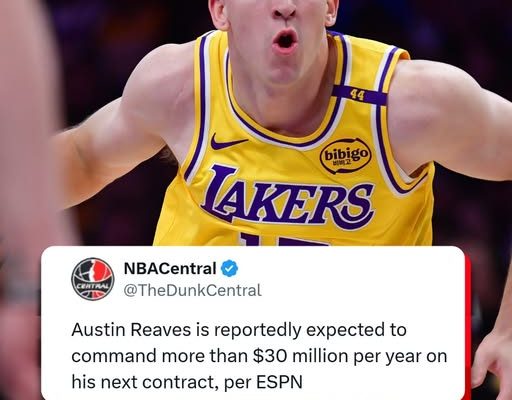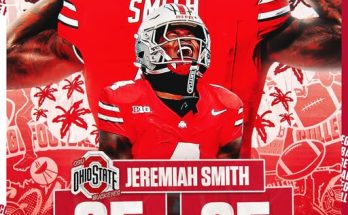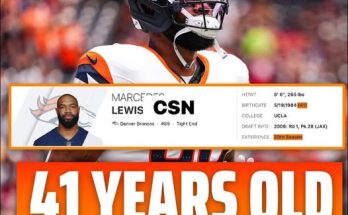The NBA offseason is often dominated by whispers, speculation, and calculated risks, but when those whispers originate from trusted insiders within front offices and respected ESPN reporters, they carry far more weight. That’s precisely the case with the latest development surrounding Los Angeles Lakers guard Austin Reaves, who has not only solidified himself as a crucial piece of the Lakers’ present but has emerged as a potential \$30 million-per-year player with significant implications for the future landscape of the Western Conference. According to multiple reports, including a growing consensus among front office personnel polled by ESPN, Reaves is expected to receive offers that cross the \$30 million annual threshold. Even more intriguing is the widespread belief that Reaves will ultimately return to L.A.—but not necessarily to continue being a sidekick to LeBron James or Anthony Davis. Instead, the expectation is that Reaves may be locked in as Luka Dončić’s long-term backcourt partner, hinting at a possible seismic shift in the near future.
For a player who went undrafted just a few years ago, Austin Reaves’ rise has been nothing short of remarkable. From a role player to a breakout star with Team USA to one of the most consistent contributors on the Lakers’ roster, Reaves has made himself indispensable in a league where consistency is gold and upside is currency. His averages last season—15.9 points, 5.3 assists, and 4.1 rebounds—only tell part of the story. What makes Reaves stand out is his basketball IQ, versatility, composure under pressure, and ability to operate both on and off the ball. He’s shown he can run an offense when asked to, hit clutch shots in the fourth quarter, and hold his own defensively against some of the league’s most dynamic guards. That kind of well-rounded game doesn’t come cheap, and teams are clearly prepared to pay a premium for it.
Sources close to the situation believe the Lakers are well aware of Reaves’ market value and have already factored his extension into their long-term salary cap projections. That said, the idea that he could somehow become Luka Dončić’s running mate in Dallas has taken many by surprise. Reaves fits the mold of exactly the kind of player Dončić needs alongside him—a combo guard who can play-make, space the floor, defend at a respectable level, and, more importantly, doesn’t need to dominate the ball to be effective. If such a partnership were to materialize, it would represent a strategic alignment for the Mavericks, pairing one of the most ball-dominant players in the league with one of the most efficient off-ball guards.
However, most executives remain firm in their belief that Reaves is more likely to stay in Los Angeles than depart for a new opportunity. Despite the Lakers’ turbulent roster overhauls and constant trade rumors, Reaves has consistently expressed his desire to remain with the team that believed in him first. From Rob Pelinka’s front office to head coach JJ Redick, there’s a unified belief in Reaves’ upside and long-term value to the franchise. For all the flash and firepower associated with L.A., Reaves represents a rare kind of dependability—a player who improves incrementally each season, stays out of drama, and can be counted on in postseason play. That’s a level of maturity that’s difficult to find, especially in players who began their careers undrafted.
Adding another layer to the speculation is the idea that Reaves could be a centerpiece in a potential Lakers “consolidation trade,” a concept recently floated by Lakers insider Anthony Irwin. The idea would be to trade multiple role players in exchange for a third star, but if Reaves’ value is as high as reported, the Lakers could just as easily build around him and a younger core, anticipating life after LeBron James. A long-term backcourt featuring Reaves and another star—whether Dončić, someone acquired via trade, or a high-upside draft pick—would give the Lakers a smoother transition into the next era. And if the idea of Reaves joining Dončić is being talked about this seriously, it raises questions about whether the Lakers are even entertaining the idea of trading Reaves at all or instead considering ways to elevate him into a cornerstone role.
It’s worth noting that Reaves’ current contract has proven to be one of the best value deals in the league. Signed last offseason to a four-year, \$54 million deal, he’s vastly outperformed that salary bracket. With the NBA’s salary cap continuing to rise and the demand for efficient two-way guards higher than ever, it’s not shocking that Reaves could command upwards of \$30 million per year in the open market. The fact that he’s still just 26 years old only sweetens the deal, offering any suitor four to five peak seasons in which to build around him.
The Dončić angle also can’t be dismissed as mere fantasy. The Mavericks have already made a series of win-now moves in the last two seasons, from acquiring Kyrie Irving to adding defensive anchors like Dereck Lively II and Daniel Gafford. However, the Kyrie-Luka pairing remains volatile, and should the Mavericks eventually seek a more sustainable and balanced backcourt combination, Reaves would represent a stabilizing presence. While Dallas doesn’t currently have the cap space to outright sign him, sign-and-trade mechanisms or future cap maneuvering could be explored, particularly if Reaves’ camp expresses interest in joining forces with Dončić. It’s also possible that some of the speculation stems from mutual admiration between the players. Reaves and Dončić have spoken highly of each other in the past, and their games theoretically complement each other well. Whereas Luka thrives in a heliocentric role, Reaves can play off the ball, make second-side reads, and hit shots off catch-and-shoot opportunities—a recipe for a seamless fit.
In Los Angeles, Reaves’ value goes beyond the stat sheet. He’s become a fan favorite, a symbol of blue-collar effort in a city that often celebrates stars. His story resonates with fans and teammates alike: small-town Arkansas kid, walks on at Wichita State, transfers to Oklahoma, goes undrafted, then fights for minutes and becomes an NBA starter on a marquee franchise. That kind of narrative is rare in a league driven by hype and lottery pedigree. If the Lakers are smart—and all signs suggest they are—they’ll see that Reaves is not just an asset but a culture-setter. He’s a bridge between the current era of aging superstars and the next generation of competitors, and his playstyle is precisely what championship-caliber teams need in the modern NBA.
Still, \$30 million a year is no small price, especially for a team like the Lakers that constantly deals with luxury tax implications and pressure to contend every season. If Reaves does command such a figure, it will undoubtedly limit flexibility in other roster areas. But compared to the money being spent on less productive, more one-dimensional players, the price seems more than justified. The NBA is increasingly shifting toward guard-centric offenses that rely on spacing, decision-making, and positional versatility, and Reaves offers all of those in spades.
So, where does that leave things? For now, the prevailing thought is that Reaves will stay in purple and gold, likely getting a massive raise that reflects both his performance and his potential. But the league is unpredictable, and when a player like Luka Dončić enters the conversation, anything becomes possible. Whether the two end up sharing a backcourt in Dallas or remain conference rivals for years to come, one thing is clear—Austin Reaves is no longer just a feel-good story or an undrafted gem. He’s a legitimate building block, and his next contract will make that status official. Front offices know it. The Lakers know it. And perhaps most importantly, Reaves knows it too.



